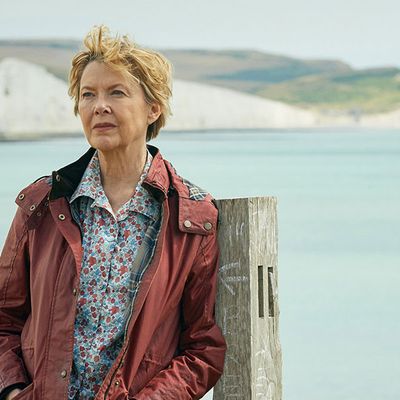
This interview originally published during the 2019 Toronto International Film Festival. We are republishing it on the occasion of the movie’s release in theaters.
In William Nicholson’s woebegone, autobiographical English drama Hope Gap, a meek-ish man named Edward (Bill Nighy) leaves his voluble wife, Grace (Annette Bening), and Grace responds the way many educated British characters do as they plummet emotionally: She talks. And she talks. She cries out to her husband in sheer disbelief. She wheedles, needles, and muses histrionically on the meaning of matrimony and family and human and cosmic mercy. It’s not iambic pentameter, but Bening — enunciating in an English accent that had me pushing away images of Emma Thompson, as one would a stray thought while meditating — runs through periods (full stops, in the U.K.) and inserts pauses mid-sentence, to suggest the squeezing of inchoate panic through the proper channels. The accent gives Bening an odd sibilance as well as an overbite I’ve never noticed: Have her very features been altered by her voice? It’s a fascinating performance, but Grace is too distanced — and too borderline insufferable — to relate to fully, even if you recognize her desperation in the face of abandonment, even if you’ve lived a version of that desperation yourself.
The movie — having its world premiere at the Toronto International Film Festival — is a brief, sad little piece that doesn’t quite hurdle the blood-brain barrier and rattle you to the core, but it does achieve a half-sublimity, thanks to coastal settings with white cliffs that inspire both awe and thoughts of flinging oneself off, and also thanks to poetry. Grace’s pet project is creating an anthology of poems arranged by emotional states (like, say, the feeling of abandonment), and at various points the characters intone the words of those who’ve been here and done that. The big set piece, in fact, is Dante Gabriel Rossetti’s “Sudden Light,” which begins, “I have been here before, / But when or how I cannot tell,” and ends with a question — whether love will be restored “In death’s despite, / And day and night yield delight once more?” Rossetti, the cliffs, and the swelling music (by Alex Heffes) supply what the characters cannot.
You don’t blame Nighy’s Edward for leaving. You blame him for how he leaves, slinking off into the arms of a younger woman who has pushed him to sever his miserable marital bond. Nighy plays Edward in his familiar key of awkward formality, stammering and keeping his gaze guiltily low. Edward points out that Grace has found him so consistently annoying over the years that he wonders why she feels so angry and bereft — but if he wonders that, he doesn’t know much about how some marriages work. His sudden realization that he and Grace were never meant to be is moving, but despite several melancholy monologues, the character doesn’t have much stature. Much of our sympathy ends up with the couple’s 29-year-old son, Jamie (Josh O’Connor), whom Grace tries to use as an emissary but who isn’t very good at it. He can’t plead Grace’s case when he doesn’t fully buy it. The actor is affecting: He seems ultimately as puzzled by his parents’ union as the writer-director does.
Nicholson is 70 and is primarily known as a writer, and in Hope Gap he doesn’t conceal his artistic flourishes artfully. The camera pans from dishes piling up in the sink to the mantle with its photos and lifetime’s worth of memories or hovers about the waves creeping over the rocks. Sometimes he will frame a character on the side of the wide screen, not so much to express alienation as to keep the person out of the boring center.
But he does one thing very well: comedy. Bening gets a real performance rhythm going when Grace buys a dog she names Edward, like her ex-husband, and teaches him the command, “Stay.” Bening seems more in her element snapping at the dog than she does delivering theatrical plaints. She’s marvelous when Grace volunteers for a grief hotline and ends up commiserating too deeply with her callers — I wanted even more of those scenes. But if Nicholson hasn’t decided whether the end of his parents’ marriage was a comedy or a tragedy, well — who ever does? He’s reaching for something he never gets: That’s not a bad way to lose. Unlike Grace, he loses gracefully.


